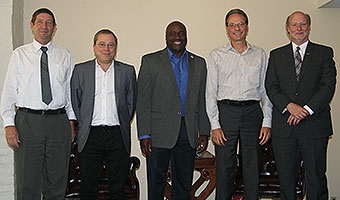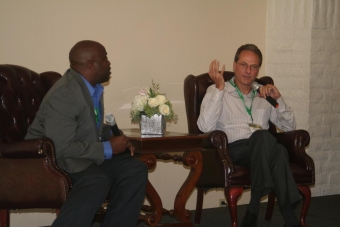Engineering Sustainability Conference 2025 Addresses Challenges of the Future
 For the third year in a row, faculty members from the Samueli School of Engineering and the Iby and Aladar Fleishman Faculty of Engineering at Tel Aviv University (TAU) came together for a joint workshop to address an engineering challenge of the future.
For the third year in a row, faculty members from the Samueli School of Engineering and the Iby and Aladar Fleishman Faculty of Engineering at Tel Aviv University (TAU) came together for a joint workshop to address an engineering challenge of the future.
At “Energy and Sustainability 2025,” faculty from the two engineering schools discussed issues involving the higher education of engineers and scientists working in sustainable energy and environmental engineering. Over two days, the engineers presented the latest research in smart grid and energy conversion, energy efficiency and power systems, water technologies, and the Internet of Things (IoT).
“Ten years ago the top 10 jobs in technology did not exist,” Samueli School Dean Gregory Washington explained to the more than 100 students, researchers and faculty attending the conference. “Google was just starting out. The first smart phone was not even invented yet. All the jobs associated with today’s technologies were not created. As educators, we need to prepare you for the future. We need to provide you with the tools that the next generation needs to solve the world's problems. That’s what this conference is about.”
A highlight of the two-day gathering was a lunch session with the school’s namesake and Broadcom Corp. co-founder Henry Samueli. UCI Chancellor Howard Gillman introduced Samueli, noting, “There is hardly a corner of the world where we don’t see the impact of the technology he developed at Broadcom.”
 In a fireside chat format, Samueli discussed the Internet of Things with Washington and then took a few questions from the audience. “The Internet of Things is a very broad label. Today, it’s anything that is connected to the Internet -- cell phones, computers -- but in time, it will include many more devices,” said Samueli. “For better or worse, there will be cameras and sensors monitoring us and our environment 24/7. Thousands of gadgets will be created. It is a great opportunity for entrepreneurs. With a few dollars and a few people, you can create all kinds of innovative devices. From that perspective, IoT is a boon. But how do you mine and store the data and authenticate the identification of the users. This is more worrisome.”
In a fireside chat format, Samueli discussed the Internet of Things with Washington and then took a few questions from the audience. “The Internet of Things is a very broad label. Today, it’s anything that is connected to the Internet -- cell phones, computers -- but in time, it will include many more devices,” said Samueli. “For better or worse, there will be cameras and sensors monitoring us and our environment 24/7. Thousands of gadgets will be created. It is a great opportunity for entrepreneurs. With a few dollars and a few people, you can create all kinds of innovative devices. From that perspective, IoT is a boon. But how do you mine and store the data and authenticate the identification of the users. This is more worrisome.”
Washington asked Samueli what advice he would offer today’s students, who are living in a time rich with opportunities for innovation and entrepreneurship. “To be an entrepreneur today, you have to be more than a technologist, you have to gain exposure to other fields [beyond engineering] -- law, business, medicine -- and build networks and partnerships across disciplines.”
Yossi Rosenwaks, TAU professor and dean, asked Samueli if he was bothered by the energy consumption of IoT. “Chips are getting more efficient, but it is an issue,” said Samueli who predicts that we will keep developing and deploying devices, but they will have to have built-in intelligence so they consume less energy. “Chips will talk directly to appliances and power systems in our homes and cars. Smart technology will pervade our lives.”
